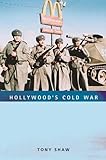Hollywood's Cold War / Tony Shaw.
Material type: TextPublisher: Edinburgh : Edinburgh University Press, [2022]Copyright date: ©2007Description: 1 online resource (352 p.) : 42 B/W illustrationsContent type:
TextPublisher: Edinburgh : Edinburgh University Press, [2022]Copyright date: ©2007Description: 1 online resource (352 p.) : 42 B/W illustrationsContent type: - 9780748625239
- 9780748630738
- Cold War in motion pictures
- Motion pictures -- History -- 20th century -- California -- Los Angeles
- Motion pictures -- Political aspects -- 20th century -- United States -- California -- Los Angeles -- United States -- USA
- Motion pictures -- Political aspects -- United States
- Propaganda, Anti-communist -- 20th century -- United States
- Film, Media & Cultural Studies
- SOCIAL SCIENCE / Popular Culture
- online - DeGruyter
| Item type | Current library | Call number | URL | Status | Notes | Barcode | |
|---|---|---|---|---|---|---|---|
 eBook
eBook
|
Biblioteca "Angelicum" Pont. Univ. S.Tommaso d'Aquino Nuvola online | online - DeGruyter (Browse shelf(Opens below)) | Online access | Not for loan (Accesso limitato) | Accesso per gli utenti autorizzati / Access for authorized users | (dgr)9780748630738 |
Frontmatter -- Contents -- Acknowledgements -- List of Abbreviations -- Introduction -- CHAPTER 1 Love and defection -- CHAPTER 2 The enemy within -- CHAPTER 3 Projecting a prophet for profit -- CHAPTER 4 Of gods and moguls -- CHAPTER 5 Negotiable dissent -- CHAPTER 6 Turning a negative into a positive -- CHAPTER 7 A cowboy in combats -- CHAPTER 8 Secrets and lies -- CHAPTER 9 The empire strikes back -- Conclusion -- Bibliography -- Film Index -- General Index
restricted access online access with authorization star
http://purl.org/coar/access_right/c_16ec
GBS_insertPreviewButtonPopup('ISBN:9780748625246);Published at a point when American filmmakers are deeply involved in the War on Terror, this authoritative and timely book offers the first comprehensive account of Hollywood's propaganda role during the defining ideological conflict of the twentieth century: the Cold War. In an analysis of films dating from America's first Red Scare in the wake of the 1917 Bolshevik Revolution to the collapse of the Berlin Wall in 1989, Tony Shaw examines the complex relationship between filmmakers, censors, politicians and government propagandists. Movies were at the centre of the Cold War's battle for hearts and minds. Hollywood's comedies, love stories, musicals, thrillers, documentaries and science fiction shockers - to list a few genres - played a critical dual role: on the one hand teaching millions of Americans why communism represented the greatest threat their country had ever faced, and on the other selling America's liberal-capitalist ideals across the globe. Drawing on declassified government documents, studio archives and filmmakers' private papers, Shaw reveals the different ways in which cinematic propaganda was produced, disseminated, and received by audiences during the Cold War. In the process, he blends subjects as diverse as women's fashions, McCarthyism, drug smuggling, Christianity, and American cultural diplomacy in India. His conclusions about Hollywood's versatility and power have a contemporary resonance which will interest anyone wishing to understand wartime propaganda today. Key FeaturesThe first comprehensive account of Hollywood's role during the Cold War.A new interrogation of the collaboration between filmmakers and government in the production of propaganda.The use of primary documentation and new archival research make this book unique."
Mode of access: Internet via World Wide Web.
In English.
Description based on online resource; title from PDF title page (publisher's Web site, viewed 29. Jun 2022)


